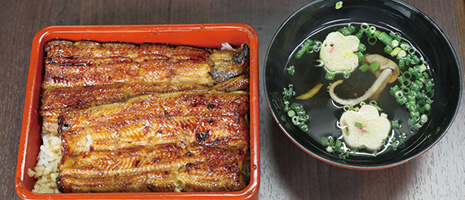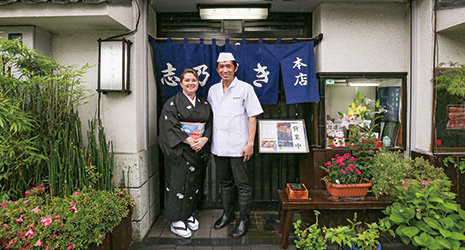Home > Highlighting JAPAN > Highlighting Japan July 2019 > My Way
Highlighting JAPAN


The Eel Restaurant Okami from America
Starting from scratch, Kristen Shinozaki has succeeded the role of okami at an unagi eel restaurant in Hachioji, Tokyo that is a local bastion of traditional Japanese cuisine.
Unagi Shinozaki is an unagi restaurant that has been in operation in Hachioji City in western Tokyo for over eighty years. Kristen Shinozaki, from Massachusetts, USA, is the okami (proprietress) of this restaurant, which is loved by many regular customers. Okami is a position with heavy responsibilities, entailing not only serving customers but also directing the management of the kitchen and employees, all the while protecting the tradition of the restaurant. Kristen says with a smile, “I became okami to work with and help my husband who took over the restaurant business immediately after we got married. Actually, it turned out that my not knowing much about the job of a restaurant manager worked in my favor. If I had known how much responsibility that position had, I would have been under a lot of pressure. Because my mother-in-law, the previous okami, was gentle and kind, I was able to become a manager without hesitation.”
The house in Boston where Kristen was raised had many Japanese visitors in connection with her father’s job. She majored in Japanese language and business at university and studied at a Japanese university in her final year. After graduation, Kristen continued to stay in Japan, and having found work for a trading firm in Omotesando, central Tokyo, chose to live in the city’s western outskirts, in Hachioji. Subsequently, she met Kenji Shinozaki, the head chef at his family’s eel restaurant, and married him. Kristen has now lived in Hachioji for over twenty years.
Kristen says, “Mount Takao is close by, and we can feel nature all around us. Hachioji thrived in the past with its textile industry. But now it has many universities and is an attractive city overflowing with youthful sensitivity.”
Kristen is also a kimono enthusiast. Hachioji still has many kimono fabric shops. She and a friend who manages one of these shops organize events in which people enjoy wearing kimono casually. When her friend teaches students the proper way of wearing a yukata (informal cotton kimono) at a girls’ high school in the city, Kristen goes to support her. Of course, she is always dressed in a kimono when working at her restaurant.
Kenji’s grandmother started to operate Unagi Shinozaki as a small dining room. By the time Kenji’s father became head chef, it had become an unagi restaurant. The restaurant keeps the live eels in well water for two days after receiving them. As this removes a smell from the eels, some customers say that after they ate unagi at the restaurant, they came to enjoy it for the first time. The chefs cut and trim the eels in preparation for cooking, steam them after receiving an order from a customer, baste them in a sauce that has been passed down from Kenji’s grandmother, and grill them over a charcoal fire. In addition to preparing the eel fillets in this way, the chefs prepare the eel’s internal organs for use in soup, grill and soft boil the head and fins as side dishes, and deep fry the bones into crackers. They use almost all the whole eel.
Kristen says, “Many customers say with tears in their eyes that they are happy that their beloved family members were able to eat unagi before they passed away or that they were disappointed that they could not give those family members an opportunity to eat unagi. I think that unagi is a special food to the Japanese.”
That is why Kenji and Kristen are always aware of working with scrupulous care. Unagi Shinozaki invites a Buddhist monk once a year to hold a memorial service for the eels. After the monk finishes chanting Buddhist sutras in a tatami room adorned with flowers and fruit, they go to the Asa-kawa river, which runs through the middle of Hachioji, and release dozens of eels.
As the manager of the unagi restaurant, Kristen speaks about her aspirations, saying, “We follow the wishes of my father-in-law, who was proud of running a restaurant specializing in eels that were getting rarer and rarer year by year. Our generation will celebrate the 100th anniversary of the restaurant’s founding.”
The Japanese have the custom of enjoying unagi for nourishment on the Midsummer Day of the Ox, which falls in the dog days of summer. It’s then when Kristen will see the arrival of the busiest season of the year.
© 2009 Cabinet Office, Government of Japan






